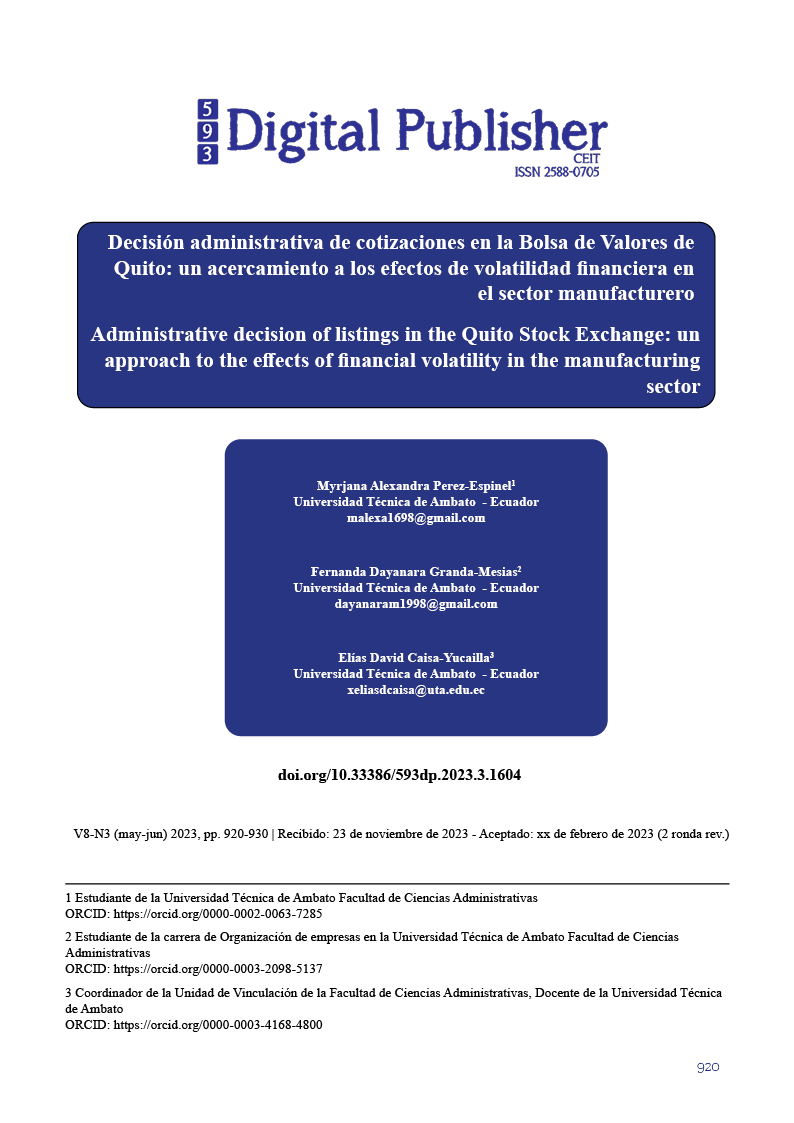Administrative decision of listings in the Quito Stock Exchange: un approach to the effects of financial volatility in the manufacturing sector
Main Article Content
Abstract
The manufacturing sector constitutes a main component of development in the national economy and the presence of the Covid-19 health crisis has caused an imbalance in its administrative and operational actions. Manufacturing industries have limited their presence in the Quito Stock Exchange for the year 2021; therefore, the present study aims to analyze the effects of financial volatility in the manufacturing sector in the Quito Stock Exchange through the application of the CAPM model. To do this, an investigation with a quantitative approach and correlational scope was used by extracting the price of the shares of the Quito Stock Exchange and the companies were determined as the unit of analysis: Cervecería Nacional C.N, Holcim Ecuador and Industrias Ales. The results obtained showed that Cervecería Nacional CN and Holcim Ecuador have a lower systematic risk than the market, while Industrias Ales did not present volatility in its prices and caused its shares not to show returns for the year 2021. In conclusion, it is convenient the purchase of shares of Cervecería Nacional and Holcim Ecuador, since, in a historical analysis, the growth of their yields has been evidenced and it is considered an investment opportunity.
Downloads
Article Details

This work is licensed under a Creative Commons Attribution-NonCommercial-ShareAlike 4.0 International License.
1. Derechos de autor
Las obras que se publican en 593 Digital Publisher CEIT están sujetas a los siguientes términos:
1.1. 593 Digital Publisher CEIT, conserva los derechos patrimoniales (copyright) de las obras publicadas, favorece y permite la reutilización de las mismas bajo la licencia Licencia Creative Commons 4.0 de Reconocimiento-NoComercial-CompartirIgual 4.0, por lo cual se pueden copiar, usar, difundir, transmitir y exponer públicamente, siempre que:
1.1.a. Se cite la autoría y fuente original de su publicación (revista, editorial, URL).
1.1.b. No se usen para fines comerciales u onerosos.
1.1.c. Se mencione la existencia y especificaciones de esta licencia de uso.
References
Ávila, M., & López, H. (2019). Resumen Calificación Quinta Emisión de Obligaciones (Estados Financieros agosto 2019). Obtenido de Bolsa de Valores de Guayaquil: https://www.bolsadevaloresguayaquil.com/sigcv/Opciones%20de%20Inversion/Renta%20Fija/Prospectos/INDUSTRIAS%20ALES%20C.A/Obligaciones/Calific.%20(5)%20Oblig.%20Industrias%20Ales%2031-10-19.pdf
Axioma Group. (Marzo de 2020). Cuatro efectos del Covid-19 en los fabricantes y que necesitan. Obtenido de Axioma Group S.A.S.: https://www.elhospital.com/temas/Cuatro-efectos-del-COVID-19-en-los-fabricantes-y-que-necesitan+133720
Banco Santander. (Diciembre de 2021). ESTADOS UNIDOS: POLÍTICA Y ECONOMÍA. Obtenido de Export Entreprises S.A.: https://santandertrade.com/es/portal/analizar-mercados/estados-unidos/politica-y-economia
BVQ. (2022). Evolución del precio de las acciones mensual. Obtenido de Bolsa de Valores de Quito : https://www.bolsadequito.com/index.php/estadisticas/boletines/boletines-mensuales
Calvo, A., Parejo, J., Rodriguez, L., & Cuervo, Á. (2014). Manual del Sistema Financiero Español. Barcelona: Editorial Planeta, S. A.
CEPAL. (2020). Los efectos del COVID-19 en el comercio internacional y la logística. https://repositorio.cepal.org/bitstream/handle/11362/45877/1/S2000497_es.pdf: Comisión Económica para América Latina y el Caribe.
Chen, F., Hsu, C., Lin, A., & Li, H. (2020). Holding risky financial assets and subjective wellbeing: Empirical evidence from China. The North American Journal of Economics and Finance, 54, 101-142.
Comun, L., & Huaman, P. (6 de Julio de 2019). Repositorio Académico UPC. Obtenido de http://hdl.handle.net/10757/626342
Coronel, J., & Ramos, E. (8 de Septiembre de 2016). Repositorio de la Universidad Catolica Santiago de Guayaquil. Obtenido de http://repositorio.ucsg.edu.ec/bitstream/3317/6808/1/T-UCSG-PRE-ECO-ADM-329.pdf
Cortez, A., Lanchimba, B., & Caicedo, F. (2021). Volatilidad de los activos financieros en las empresas del sector industrial que cotizan en la Bolsa de Valores de Quito. Repositorio Dspace, http://repositorio.espe.edu.ec/xmlui/handle/21000/24408.
Diez, S. (2016). METODOLOGÍA DE CÁLCULO DEL COSTO PROMEDIO PONDERADO DE CAPITAL EN EL MODELO DEL WACC. revista Empresarial Latindex, 33-45.
El Comercio. (30 de Diciembre de 2021). La bolsa de valores de Ecuador busca despegar en 2021. El Comercio, págs. https://www.elcomercio.com/actualidad/negocios/bolsa-valores-ecuador-economia-mercado.html.
Florez, L. (2008). Evolución de la Teoría Financiera en el Siglo XX. Ecos de Economía, 12(27), 145-168.
Grande, D. (27 de Abril de 2018). Universidad Nacional de Rosario. Obtenido de http://rephip.unr.edu.ar/bitstream/handle/2133/11518/Tesis%20Dante%20Grande%20VFINAL%2027-04-2018.pdf?sequence=2
Hernández, R., Fernández, C., & Baptista, P. (2014). Metodología de la Investigación (Sexta ed.). Mexico: McGRAW-HILL.
Jimenez, M. (7 de Julio de 2016). Universidad Carlos III de Madrid. Obtenido de uc3m: http://hdl.handle.net/10016/28430
López, M. (2016). Repositorio Digital UCE. Obtenido de http://www.dspace.uce.edu.ec/handle/25000/8723
Nivin, R. (2019). Medidas alternativas de volatilidad en el mercado de valores peruano. REVISTA DE ANÁLISIS ECONÓMICO Y FINANCIERO, 7-14.
Peñafiel, L. (2021). Trasmisión de Volatilidad del COVID-19 a los Precios de Acciones del Sector Bancario e Industrial de Sudamérica, México y Estados Unidos. Revista Tecnológica - ESPOL, 33(1).
Red de Instituciones Financieras de Desarrollo y Equifax. (Febrero de 2020). Covid-19 y sus implicaciones en el Sistema Financiero Nacional. Ecuador: Red de Instituciones Financieras de Desarrollo.
Rodríguez, M. (18 de Julio de 2017). epositorio Digital Institucional de la Escuela Politécnica Nacional. Obtenido de http://bibdigital.epn.edu.ec/handle/15000/17502
Roque, I., Muñoz, A., Escobar, J., & De Con, F. (2021). El uso de la beta contable como método de evaluación de riesgos para empresas no cotizadas en Colombia. Universidad y Sociedad, 13(2).
Rupande, L., Tinotenda, H., & Muzindutsi, P. (2019). Investor sentiment and stock return volatility: Evidence from the Johannesburg Stock Exchange. Cogent Economics & Finance, 7(1).
Vivanco, J. (2019). El índice BETA como base de predicción de riesgos en carteras de inversión. Trascender, Contabilidad y Gestión, 42-51.




